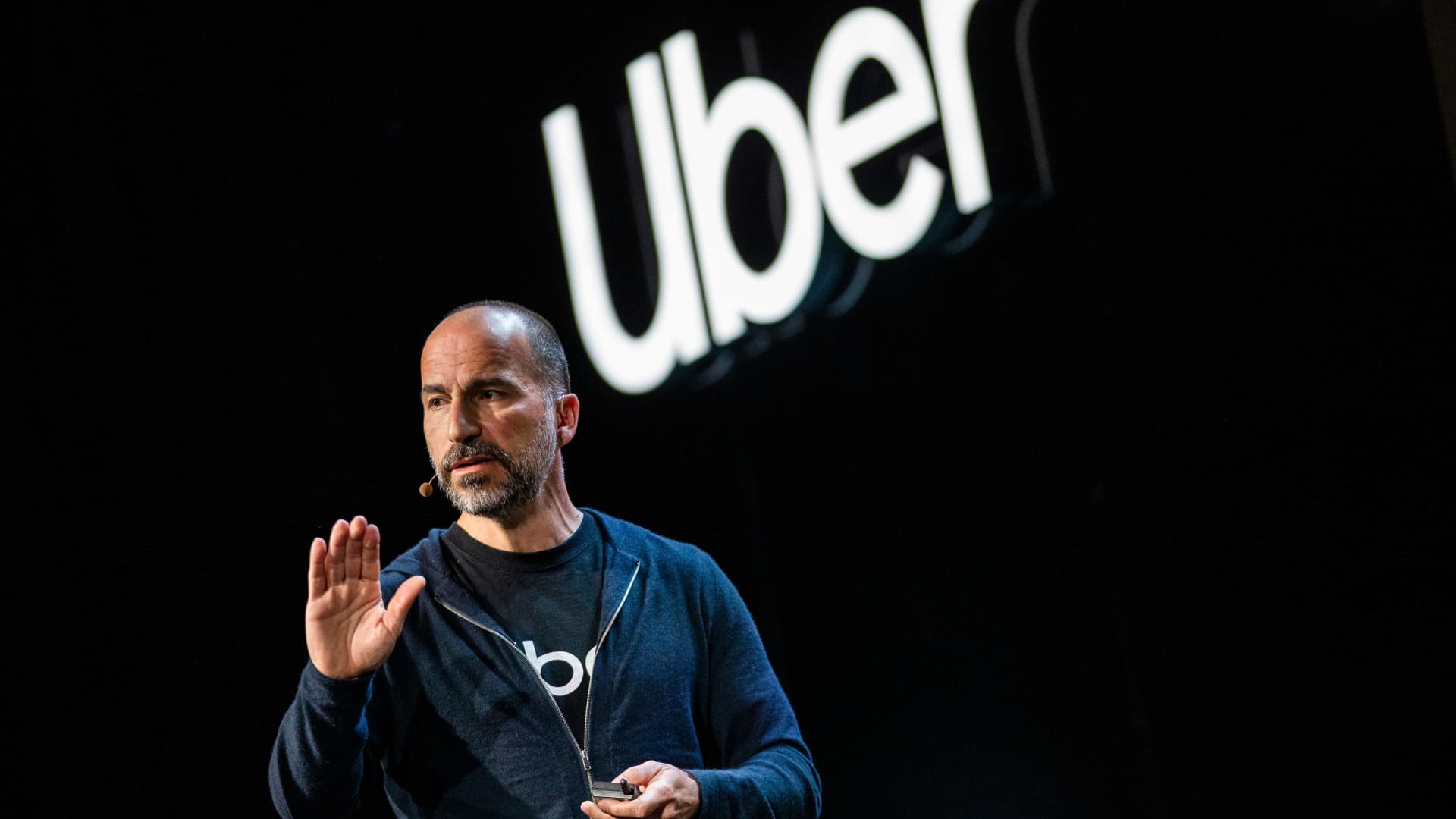Uber reported a third-quarter loss Tuesday but beat analysts’ estimates for revenue and gave strong fourth-quarter guidance. Its shares were up about 15% early Tuesday morning.
Here’s how the company did:
- Loss per share: 61 cent loss vs. 22 cent loss expected by analysts, according to Refinitiv.
- Revenue: $8.34 billion vs. $8.12 billion expected by analysts, according to Refinitiv.
Uber reported a net loss of $1.2 billion for the third quarter, $512 million of which was attributed to revaluations of Uber’s equity investments, according to a company release. Revenue was up 72% year over year.
In a prepared statement, CEO Dara Khosrowshahi said Uber delivered a “strong quarter” and benefited from booming travel, easing lockdowns and shifts in consumer spending. He said October is tracking to be the company’s “best month ever for both Mobility and total company Gross bookings.” However, he cautioned that after the last few years, the company has learned not to take anything for granted.
“With continued rigor around costs, discipline on headcount, and a balanced capital allocation approach, all supported by our leading technical and operating capabilities, we are well positioned to deliver expanding profitability over the coming quarters,” Khosrowshahi said.
The company reported a record adjusted EBITDA of $516 million, beating guidance of $440 million to $470 million and ahead of analyst estimates of $457.7 million according to StreetAccount. Gross bookings for the quarter came in at $29.1 billion, up 26% year over year.
For the fourth quarter of 2022, Uber said it expects gross bookings to grow between 23% and 27% year over year on a constant currency basis, and an adjusted EBITDA of $600 million to $630 million. Analysts surveyed by Refinitiv expected $568 million in adjusted EBITDA for the fourth quarter.
Here’s how Uber’s largest business segments performed in the quarter:
Mobility (gross bookings): $13.7 billion, short of analysts’ estimates of $13.83 billion according to StreetAccount.
Delivery (gross bookings): $13.7 billion, short of analysts’ estimates of $14.01 billion according to StreetAccount.
Uber relied heavily on growth in its Eats delivery business during the Covid pandemic, but its mobility segment surpassed Eats revenue in its first and second quarters as riders began to take more trips. That trend continued during the third quarter, as the company’s mobility segment reported $3.8 billion in revenue while delivery reported $2.8 billion.
Uber’s freight business booked $1.75 billion in sales.
The number of monthly active platform consumers climbed to 124 million in the third quarter, up 14% year over year. There were 1.95 billion trips completed on the platform during the period, up 19% year over year.
Khosrowshahi told CNBC’s “Squawk Box” on Tuesday that the company has also recovered 80% in terms of the number of drivers who have returned to the service.
Shares of Uber are down more than 36% so far this year. The stock tumbled more than 10% in October after the Biden Labor Department released a proposal that could pave the way for regulators and courts to reclassify gig workers as employees. The proposed rule could raise costs for companies like Uber, Lyft, Instacart and DoorDash that rely on contract workers to pick up shifts on their own time.
The companies have contended that flexible schedules are attractive to workers, but some labor experts and activists have disagreed, saying the companies use the contractor model to reduce their own costs and deny workers important protections.
Uber has also had to contend with high gas prices and inflation, but Khosrowshahi told CNBC’s “TechCheck” in September that its supply side may actually be benefiting from the inflationary environment.
As expenses rise and people are paying more for essentials like groceries, he said they are also signing up to drive for Uber.
“If anything, 72% of drivers in the U.S. are saying that one of the considerations of their signing up to drive on Uber was actually inflation,” he said.
— CNBC’s Lauren Feiner contributed to this report.
